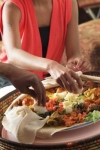- About GPA
- Global Events
- GLOBAL NEWS FROM PHL
- Global Directory
- World Heritage City
- Sustainable Development Goals (SDGs)
- Global Philadelphia Role on Sustainable Development Goals
- Completed Sustainable Development Goals
- SDG#1: No Poverty
- SDG #2: Zero Hunger
- SDG#3: Good Health & Well-Being
- SDG#4: Quality Education
- SDG#5: Gender Equality
- SDG#6: Clean Water & Sanitation
- SDG#7: Affordable and Clean Energy
- SDG #8: Decent Work and Economic Growth
- SDG #9: Industry, Innovation, and Infrastructure
- SDG#10: Reduced Inequalities
- SDG#11: Sustainable Cities and Communities
- SDG#16: Peace, Justice and Strong Institutions
- SDG#17: Partnerships for the Goals
- Press
Home ›
Middle Eastern and Central Asian

Immigrants from the Middle East and Central Asia constitute a small percentage of the foreign born in Philadelphia. People from all over the region, including Afghanistan, Lebanon, Iraq, Israel and Palestine, have come to the United States to do business and to live in peace. The majority of immigrants are Arab, stemming from the Arab peninsula.
Arabs have made Pennsylvania their home for over a century. Early communities were established in the 19th century, when Syrian-Lebanese immigrants came to work as peddlers and subsequently settled in towns and cities across the state. Some opened shops, while others were attracted to the mining and steel industries.
In the 20th century, new Arab immigrants and refugees arrived from Syria, Lebanon, Palestine, Egypt and Iraq.
Arab Americans have created a home for themselves through the many diverse businesses established in Philadelphia. Cousin’s Supermarkets, a popular chain of grocery stores in North Philadelphia, began as the business venture of two cousins from Mukhmas, Palestine. Cousin’s Supermarkets are noted for offering a wide variety of groceries and produce, catering to a largely Latino clientele.
After the bombing of the World Trade Center on September 11, 2001, Arab Americans faced new challenges as hate crimes against Muslims and Arabs increased in the U.S. In Philadelphia, businesses were attacked, the Arab American Association received numerous death threats, and many Arabs reported instances of harassment. At the same time, many Arab Americans also reported gestures of kindness and support from friends and acquaintances. Alliances with other ethnic communities, such as Japanese Americans and South Asians, have helped the Arab community address negative attitudes and civil rights violations.
Despite anti-Arab sentiment, many Arab Americans are dedicated to remaining active citizens in their local communities. Philadelphia’s Arab Americans have been active in local and national political life. These activities play a vital role in residents’ ability to infuse their daily lives with an Arab and American accent. Though Arabs do not constitute a major immigrant groups in Philadelphia, here we examine the Lebanese and Palestinian populations and their lives in Philadelphia.
LEBANON
POPULATION
No U.S. Census estimate
WHERE THEY LIVE
Historically, Philadelphia’s Lebanese population is centered in South Philadelphia around 10th and Ellsworth streets. Today, Lebanese are dispersed throughout the city and suburbs. A new enclave has formed in Newtown Square where a Maronite church was established in the 1990s.
COMMUNITY
Lebanese Club of Philadelphia
PALESTINE
POPULATION
No U.S. Census estimate
WHERE THEY LIVE
Palestinians are dispersed throughout the city and suburbs of Philadelphia and South Jersey. Most Palestinians come from towns along the West Bank. One enclave is located in Feltonville, the center of a thriving Palestinian community, most of whom come from the village of Mukhmas.
COMMUNITY
Philadelphia Free Palestine Coalition Facebook page
The Philly Palestine Coalition









